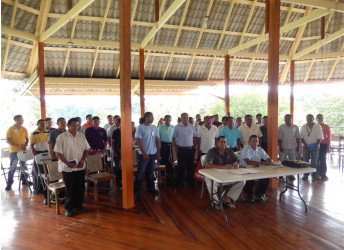The Iwokrama Inter-national Centre (IIC) for rainforest conservation on January 14th 2016 renewed the Collaborative Management Agreement (CMA) and the Memoran-dum of Understanding (MOU) it holds with the 20 communities of the North Rupununi.
In a statement, the IIC said that the communities are represented by the North Rupununi District Development Board (NRDDB). The renewal signing ceremony was held during the recent statutory meeting of the NRDDB, which for the first time, was held at the Centre’s River Lodge at Kurupukari on the Upper Essequibo River.
IIC, dedicated to rainforest conservation, said that the renewal process was the result of four months of consultations with the communities which extend from Fair View within the Iwokrama Forest, to the riverain communities of Rewa, Crash Water and Apoteri, and across to the foot hills of the Pakaraimas Mountains – with approximately 7,000 residents.

The statement said that the Centre’s history with the communities dates back to 1989 when the offer of the Iwokrama Forest to the international community was made by then President Desmond Hoyte at the Common-wealth Heads of Govern-ment Meeting in Kuala Lumpur, Malaysia.
The relationship was formalised in 1996 through the Iwokrama Act and the registration of the NRDDB as the legally recognised body overseeing the interests of the North Rupununi Communities.
The statement said that the MoU and CMA provide guidance on the cooperative relationship between the Centre and the NRDDB in relation to the co-management of the Iwokrama Forest, indigenous lands, fragile ecosystems and the livelihoods they support.
Iwokrama’s statement said that it has provided much support to the communities through capacity building and training exercises in areas such as health and education, conservation, monitoring, research, natural resources management, climate change and enterprise development.
The collaborative effort, the statement said, has led to many landmark achievements such as the development of the first Community Monitoring Reporting and Verification System (CMRVS) in Guyana and the recent rescue 27 Arapaima fish which were trapped in a drying pond.
It added that a testament to the close working relationship with the communities was the Centre’s no-objection and condition-free approach to the village of Fair View receiving land title to Iwokrama Interna-tional Centre, approximately 22,000 ha of the Iwokrama Forest in 2006. The Centre continues to work with the community to manage this area which has not been excised from the Iwokrama Forest and is still included in Iwok-rama’s forest management planning activities.
Dane Gobin, CEO of Iwokrama noted that the continued collaboration by Iwokrama and communities at this particular juncture was significant as the relationship started with the communities relying heavily on the Centre for support and today the capacity of the communities has been significantly boosted through cooperation with the Centre and other partners – so the agreements now need to reflect this enhancement of capacities, where there is much less dependency on the Centre and much more reciprocity with the communities.








